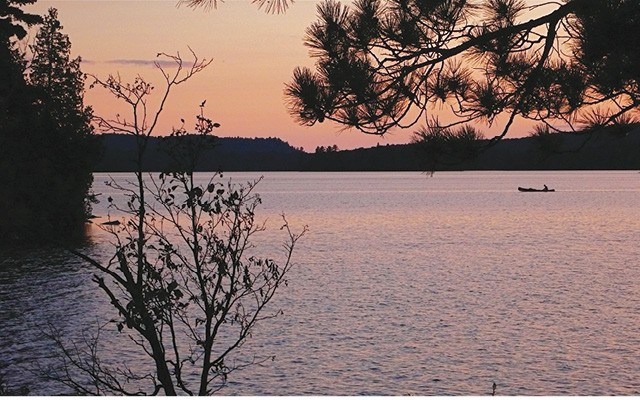He could smell the water. Or, to be more accurate — as he nerdily aspired in those days of pouch-bound nylon windbreakers and cowboy-constellated, flannel sleeping bags — whatever it was in the water that produced this ether. Was it algae, pollen, dead fish? Maybe all three. He knew this much: pure water, the kind distilled in a laboratory, the kind his mother used for ironing, had no odour. And yet these sweetwater lakes of the Shield frothed a detectably swampy mélange — molecular midges hatched from a choppy surface to swarm up the trail on an afternoon breeze.
In the forest where he moved, other smells swirled, trailside zephyrs folding the layers as quickly as they rose from the forest floor: whiffs of fungus, decaying leaves and the mud tilled by countless feet; pine gum, mint, and wild onion; the metallic tang of sun-warmed rock. And this woodsy parfait came with its own soundtrack: in the canopy above, wind raced from solstice to equinox, descending and rising in the shimmer of a billion leaves and needles. Birch and maple and pine and fir all clamouring on their stems like softly clapping hands, a consensus on summer's waning grip.
He well knew this treetop symphony, had always thought it the northwoods' great irony — a loud rush that seemed to beg silence. Shhhhhhhhhh... it went, filling the sky like some great exhalation. Shhhhhhhhhh...
Whatever. Chorusing greenery evoked no quiet this day. Nor, despite the occasion, celebration. Instead, the boy heard only farewell. Thanks for coming out, waved the leaves and swaying branches, until next time. And then he was jogging down the rocky track toward that very goodbye, with a Voyageurs' burden of wood and varnish and canvas balanced across shoulders more brown and muscled and scarred than those of most 16-year-olds. The trail hooked left toward the lake, and the strengthening pulse of wind on exposed skin quickened his pace. A small brigade of mosquitoes — vanguard of infinite legions that lurked hungry and hopeful of just such serendipity — now fled in panicked retreat, tumbling from the once-safe eddies of neck, elbows, and knees, back into the still haven of underbrush.
He felt relief in that breezy turn, from the heat and the pestering bugs to be sure, but also from the uncertainty of distance. The water was near. Shifting the canoe's weight, he raised up the front as the peak of a comic bicorn, and peered down a path cut by sunlit wedges, scanning for the familiar sheen. Ah, there. Girded by maples, the broken glass of a windswept lake.
It had been 26 days on the water; 540 kilometres and maybe only 20 more to paddle. And so much already consigned to time. Struggle and misery in the face of raw nature, passage and movement and joyous prevail, stubbed toes and some god-awful food. These were the postcards he mailed himself daily. And in those closing moments on the trail, memory sought to sort them by association: crossing a morning-stilled bay ringed in lily pads would forever be like gliding into a fairy tale; dragging a loaded craft through a beaver swamp, chest-deep in the rain, emblematic of a canoe trip's eternal waterlogging; the adrenalized rush of running a rapid would equal the subsequent buzzkill of patching a ruptured hull; surging over a grey lake under paddle-rigged sails on a cold north wind now spoke of autumn's sharp descent, of a land surrendering heat to Earth's lengthening orbit. And here, where the trail stepped down to a sandy beach tossed with mink-gutted clams and pitch-stained driftwood, was one final tableaux: the end. At least as seen figuratively in the amphibious world of canoe tripping — the last portage.
Labouring beneath the weight of a wooden vessel swollen by the rains and dunkings of a month on the move, a two-km carry was long no matter how many you'd done before. Still, he'd flashed over it with the energy of purpose. Sidestepping a worry of rocks in the frayed canvas sneakers he'd worn for the duration, the outside toes of each foot exposed, he waded quickly into the water, thigh deep, flipping the canoe off with a flat, hollow splash. And then he stood, stretching upward, letting cool air steal the sweat, rolling his shoulders, working back the blood.
So... that's it?
He was vaguely aware of an upwelling that had no name, an urge to speak. But he was the first across and there was no one there with which to share a Woo! or We did it! or Shit... it's over and see which emotion stuck, for they were surely mixed. Could you really feel both empty and full in the same moment? He was too young to sense where the truth lay. To understand that a great sense of accomplishment was always, somewhere inside, wrestling the viscera of attachment. At 16, triumph had always been enough, but now there was more: the need to hang on to something transformative...
Next week: A Distant Mirror
Leslie Anthony is a Whistler-based author, editor, biologist and bon vivant who has never met a mountain he didn't like.
It had been 26 days on the water; 540 kilometres and maybe only 20 more to paddle.




